Imagine a criminal case where the government sends the defendant’s lawyer a request to produce emails between the alleged conspirators, bank records showing payments to the defendant’s offshore account, or a recording of a key meeting. You wouldn’t expect to get much, would you? That’s why we have search warrants.
Civil litigation is different. In a civil case, the system largely relies on the parties themselves to search for and produce documents that the requesting party can then use to prove its case. Generally, you don’t get to search the opposing party’s office for relevant documents.
The same general rule applies to computer files: you don’t get to search the other side’s computers or other devices. There are exceptions, but the Texas Supreme Court has set the bar high for obtaining an order authorizing “direct access” to an opposing party’s electronic files.
In In re Weekley Homes, 295 S.W.3d 309 (Tex. 2009), the court held that intrusive measures such as direct access to a computer or other electronic storage device require, at a minimum, that the benefits of the discovery outweigh the burden imposed. Permitting direct access “is particularly intrusive and should be generally discouraged,” the court said, “just as permitting open access to a party’s file cabinets for general perusal would be.” To obtain direct access, “the requesting party must show that the responding party has somehow defaulted in its obligation to search its records and produce the requested data.”
More recently, the Texas Supreme Court applied Weekley in In re Shipman, 540 S.W.3d 562 (Tex. 2018). The court held that the responding party’s late production of responsive documents and testimony that some files had been deleted years earlier was insufficient to justify direct access. The responding party testified by affidavit that he had searched both electronic and paper files and produced all responsive documents, and the requesting party made no showing that the responding party was incapable of searching his computer.
Weekley Homes and Shipman were not “departing employee” cases—the type of case I handle most often—but direct access is an important issue in departing employee litigation. Let’s look at the transcript of a hypothetical hearing to see how these cases might apply in a typical departing employee case.
Hearing Transcript
Judge Lansing: Alright, next case up is Cause Number 19-24601, Paula Payne Windows v. Dawn Davis. Mr. Livingston, who are you here for?
Livingston: Good morning, judge. I’m here with Phil Hamilton for the plaintiff on a motion to compel.
Reynolds: Maria Reynolds here for the defendants, Your Honor.
Judge: Good morning, Ms. Reynolds. Was there a response to the motion?
Reynolds: Yes, we filed a response yesterday.
Judge: Well if I can get this computer on, maybe I can pull it up. Can you . . .
Reynolds: I have a binder with the motion and response if that would make it easier.
Judge: Sure, I’ll take your binder. This looks like a lot of material. Have y’all talked about this already?
Reynolds: Not really. All I got was an email from Mr. Hamilton demanding we turn over Ms. Davis’s laptop. That’s part of the problem, we’ve been trying . . .
Hamilton: Your Honor, that’s not exactly right. We talked about these issues at Ms. Davis’s deposition. That’s when she said . . .
Judge: Ok, well, I’ll hear your arguments on the motion. But first back up a little and remind me what this case is about. Mr. Hamilton?
Hamilton: Yes, of course. This is a case about theft of trade secrets. Dawn Davis worked for my client, Paula Payne Windows, for five years. She was very well paid. She rose up their top sales position, and she had access to all of their confidential information and trade secrets. Then about six months ago she suddenly left and went to work for a competitor, and that’s the other Defendant, Real Cheap Windows.
Judge: Ok, I remember this case now. But what kind of trade secrets does a windows company have?
Hamilton: There are two things we’re most concerned with, Your Honor. First, Paula Payne has a Master Customer List spreadsheet that has detailed information about every one of their customers. Second, for each customer there is a Sales History spreadsheet that has every sale including price, quantity, date, margins—everything a competitor would need to try to undercut my client.
Judge: I see. So you want me to compel Ms. Davis to produce those documents?
Hamilton: Actually, you already did that. If you take a look at tab C, that’s your order requiring Defendants to produce “all documents Davis received from Paula Payne during her Employment Period, including all customer lists and sales records.” We’re asking you to order her to produce her laptop so our forensic expert can see if our Master Customer List and Sales History spreadsheets were on it.
Judge: Ok, hold that thought. I want to hear from Ms. Reynolds.
Reynolds: Thank you, judge. I’ve been biting my tongue. This is an outrageous demand for direct access to my client’s computer. It is no different than a request to rifle through her file cabinets.
Judge: Well hold on, let’s take this one step at a time. Did your client comply with my previous order?
Reynolds: Absolutely. Ms. Davis searched her home office and produced a banker’s box full of documents. But she didn’t find any customer list or sales history documents. Now they’re asking for native Excel files, but they never specifically requested those. If I could approach, here is a copy of Rule 196.4:
Judge: What the hell is “magnetic” data?
Reynolds: Honestly, judge, I think that was a little before my time, but the issue here is electronic data. Paula Payne wants to search my client’s computer for electronic files, like Excel spreadsheets, but they never specifically asked for electronic files.
Hamilton: Actually, we did. This is from our First Request for Production:
Judge: That’s pretty general. Wouldn’t it be better practice to include the electronic files you want in the specific request for production? You could have said “including native Excel spreadsheets and other electronic files” in your request, right?
Hamilton: We could have, Your Honor, but the two leading cases on this, Weekley Homes and Shipman, both say it’s sufficient if we clarify in our motion to compel that we’re asking for electronic files. Here is an excerpt from Shipman, citing to Weekley:
Hamilton: The situation here is the same. Our definition of “documents” included electronic files, and our motion makes it abundantly clear what we’re asking for.
Judge: Ok, I think you’ve sufficiently asked for computer files, so let’s talk about direct access. What’s your basis for that?
Hamilton: We are allowed to obtain direct access to an electronic device if we “show that the responding party has somehow defaulted in its obligation to search its records and produce the requested data.” That’s straight out of Shipman, quoting from Weekley. And that’s exactly what we have here. After Ms. Reynolds produced the box of hard copy documents, we sent her a letter pointing out that her production did not include any electronic files, and we specifically asked if Ms. Davis had searched her laptop. She responded in an email and said “my client has conducted a reasonably diligent search and has produced all responsive non-privileged documents.”
Judge: So she doesn’t have the documents. What’s the problem?
Hamilton: Later we took Dawn Davis’s deposition, and here’s what she said:
Hamilton: It’s obvious from her evasive answers that she did not conduct a diligent search of her laptop for the documents we requested, even after we specifically inquired about electronic files. That’s a default in her obligation to search her records and produce the requested records.
Judge: Alright, let me hear from Ms. Reynolds on this.
Reynolds: Your Honor, there is no default. This case is just like Weekley and Shipman, where the Texas Supreme Court ruled against direct access. In Weekley the court said you cannot rely on “mere skepticism or bare allegations that the responding party has failed to comply with its discovery duties.” That is all we have here, just mere skepticism and speculation. There is no proof that Ms. Davis failed to search her laptop.
Judge: Mr. Hamilton, how is this case any different from those cases?
Hamilton: It’s totally different. Weekley was about whether deleted emails were specifically requested; that’s not our issue. Shipman was a case about late production. Here is an excerpt from Shipman with its key facts:
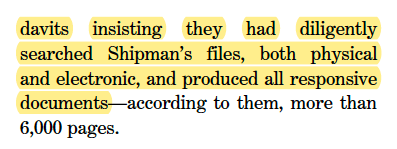
Judge: Ms. Reynolds, do you have an affidavit from your client saying she searched her computer?
Reynolds: No, Your Honor. But that’s not my burden. If you look closely at Shipman, the court made it clear that the requesting party has the burden to prove that the responding party has defaulted on its discovery obligations. “Mere skepticism” doesn’t meet their burden:
Reynolds: It’s the same thing here. Paula Payne hasn’t offered any evidence that my client is incapable of searching her computer or that she hasn’t conducted a diligent search. You have to say no to this.
Judge: What about her deposition testimony? Isn’t that evidence she didn’t do a diligent search.
Reynolds: She said she wasn’t sure if she transferred the customer list or sales histories to her laptop. That’s just like Shipman. The court said that Shipman’s “equivocation about the existence of discrete documents at his deposition” did not “transform general skepticism into discovery default.” Shipman was asked about “discrete, individual documents” from more than five years before the deposition and stated he was “unsure if they existed.” My client’s testimony was similar.
Judge: I understand, but did she search her computer? The defendant in Shipman signed an affidavit that specifically said he searched both electronic and hard copy records.
Reynolds: I don’t know all the details of her search. She has stated that she conducted a diligent search and produced all the responsive documents she found. If Paula Payne wants to ask her about all the little details, they can do that in a deposition.
Hamilton: Your Honor, we tried! We asked . . .
Judge: You can sit down, Mr. Hamilton. I’ve heard enough. I’m going to grant the motion to compel and order Ms. Davis to turn over her laptop to Paula Payne’s expert. Counsel are to confer on the details of a forensic protocol and put it in a proposed order. If y’all can’t work that out, come back and see me.
Reynolds: Your Honor, I really think it would be error to do this. The Texas Supreme Court has been clear.
Judge: Well that’s my ruling. And if y’all have to take it up to the Court of Appeals on mandamus, I won’t be offended. Good to see all of you. Even you, Mr. Livingston [laughter in courtroom]. So did you catch any bass last weekend?
Livingston: I’m afraid not. Nothing biting last weekend except the mosquitoes.
Judge: Well that’s too bad. Anyway, give Connie my best.
Livingston: Thank you, judge, I’ll do that.
Judge: Alright, everyone can be excused.
What Did We Learn Today?
As this hypothetical illustrates, Weekley and Shipman are pretty simple in principle: you have to show the other party defaulted on its discovery obligations before you get direct access. But in practice this can be a difficult principle to apply.
An End Run Around Weekley?
Maybe you can avoid these difficulties by asking for a temporary restraining order or temporary injunction. That’s what the plaintiff did in Retail Services WIS Corp. v. Crossmark, Inc., No. 05-20-00937-CV, 2021 WL 1747033 (Tex. App.—Dallas May 4, 2021, no pet. h.), a case involving alleged misappropriation of trade secrets. The trial court’s injunction included a “Device Turnover Order” ordering the defendants to turn over their devices to the plaintiff’s counsel for forensic inspection. Id. at *6. The defendants argued this was an end run around the Weekley requirements, but the court of appeals disagreed. Id. at *14-15. “Weekley involved rule 196.4 discovery rather than a temporary injunction and was not a trade secrets case,” the court said. Id. at *15. “[W]e cannot conclude Texas law entirely precludes mandatory injunctions requiring production of digital storage devices when the applicable standards—including rule 683’s specificity and irreparable injury requirements—are met.” Id.
That makes sense in theory, but in practice it’s a recipe for making direct access orders routine in departing employee cases. Keep in mind, not every judge is a stickler for the requirements of the “extraordinary” remedy of a TRO or temporary injunction. Some judges will sign whatever TRO is put in front of them once they conclude the plaintiff has a case. I fear cases like Retail Services will only encourage the trend of routinely including direct access in proposed TROs. That may not violate the letter of Weekley‘s limitations on direct access, but it certainly violates their spirit.
*Update 1: In re Methodist Primary Care Group, 553 S.W.3d 709 (Tex. App.—Houston [14th Dist.] 2018, orig. proceeding), applied Weekley in a departing employee case. The court held there was sufficient evidence the responding party did not fully comply with its obligation to search electronic records, but that the trial court abused its discretion ordering direct expert access, where less intrusive means could suffice and the trial court’s order would require production of documents that were not requested. Id. at 721-22.
*Update 2: In re Wilcox, No. 09-20-00271-CV, 2021 WL 1031141 (Tex. App.—Beaumont March 18, 2021, orig. proceeding) focused on the “proportionality” and “least intrusive” elements of Weekley. There was evidence that the responding party, Wilcox, failed to produce emails that another party produced, but the trial court abused its discretion by ordering Wilcox to “turn over his electronic devices and home computer, as well as his personal account and storage information to a third-party, and to allow intrusive discovery of personal electronic devices that contain vast amounts of information totally unrelated to any legitimate inquiry when it could have simply required Wilcox to run specific searches and produce responsive data narrowly tailored to the parties’ dispute.” Id. at *4.
*Update 3: In In re 4X Industrial, LLC, __ S.W.3d __, No. 14-23-00183-CV, 2024 WL 333798 (Tex. App.—Houston [14th Dist.] Jan. 30, 2024), the Houston Court of Appeals held that the plaintiff in a trade secrets lawsuit is not automatically entitled to a forensic examination of a defendant’s device that was used to take the defendant’s alleged “trade secrets.” Rather, to obtain an order for “direct access” to the defendant’s computer or electronic storage device, the plaintiff must satisfy the requirements established by the Texas Supreme Court in Weekley Homes, which include showing that the defendant defaulted on his discovery obligations. 2024 WL 333798 at *6.
____________________________________

These are his opinions, not the opinions of his firm or clients, so don’t cite part of this post against him in an actual case. Every case is different, so don’t rely on this post as legal advice for your case.


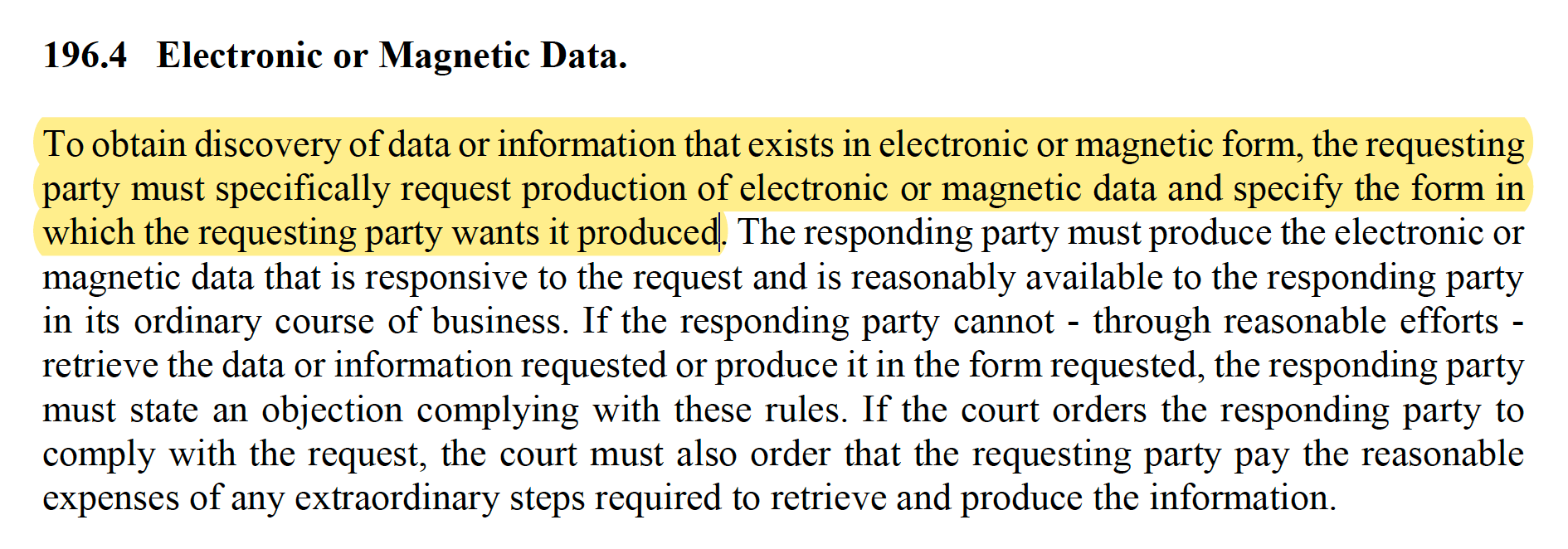

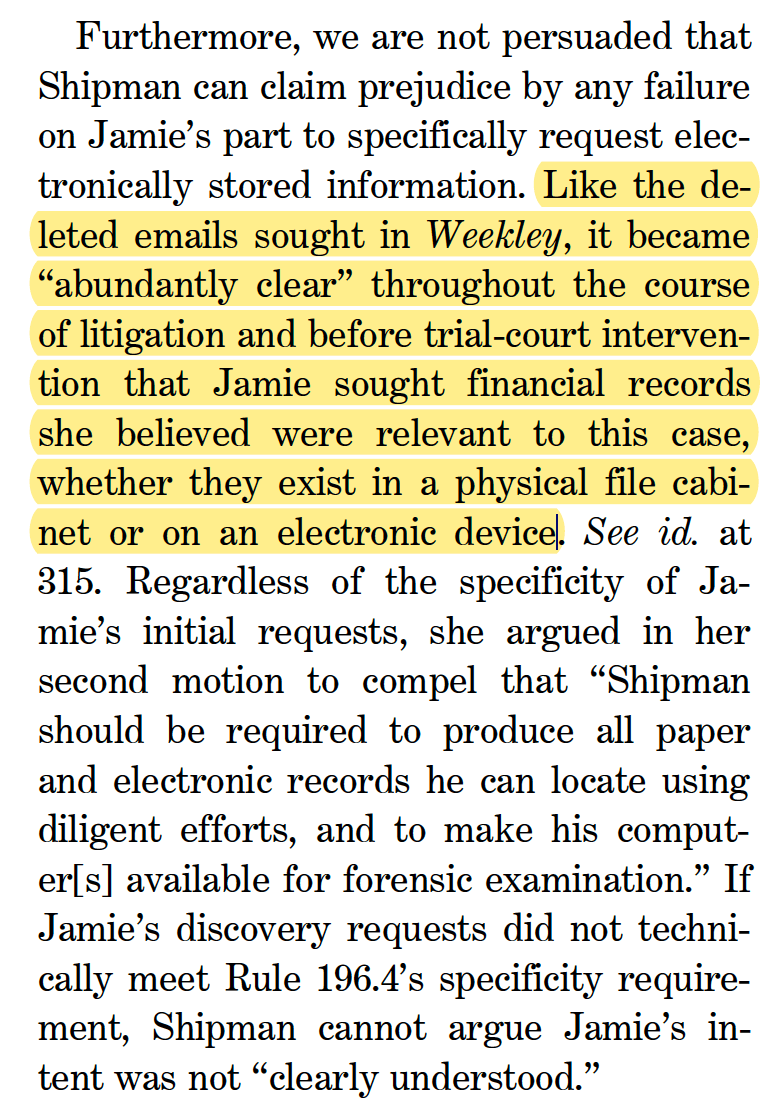
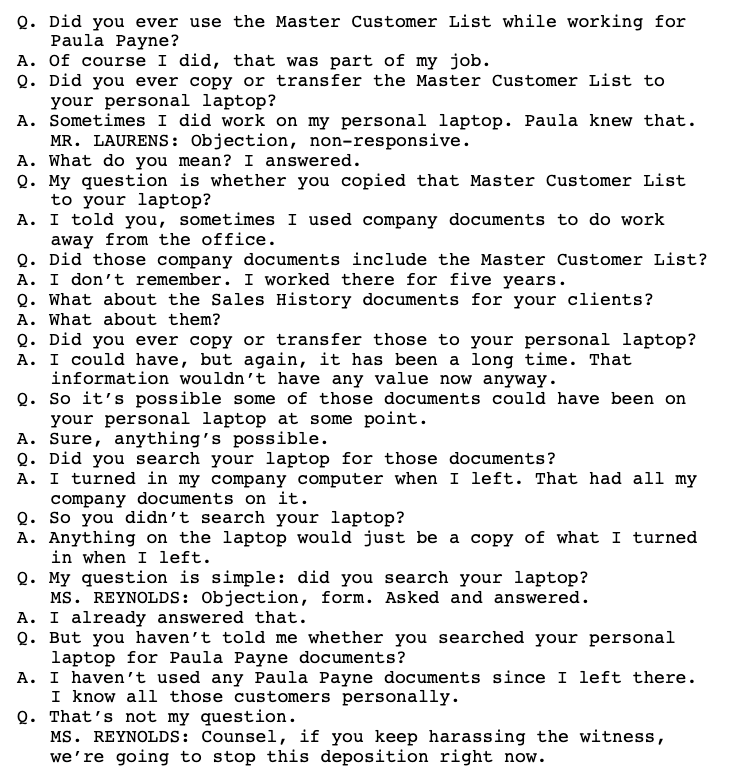
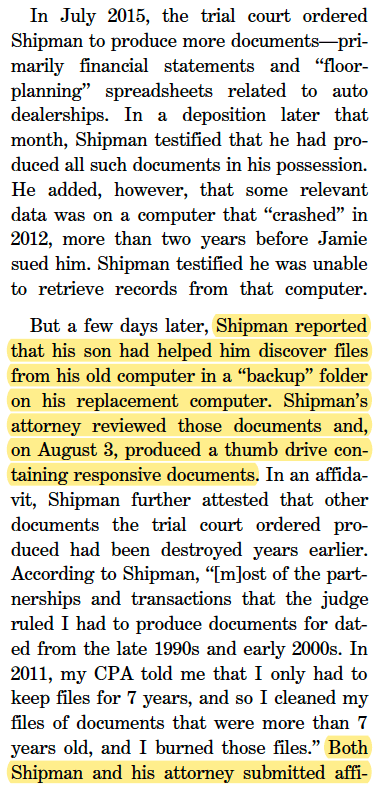
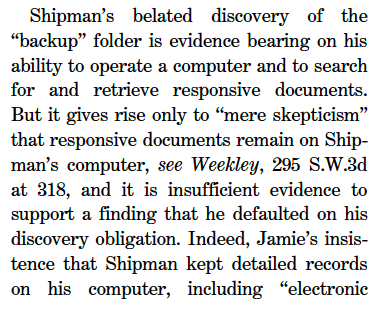
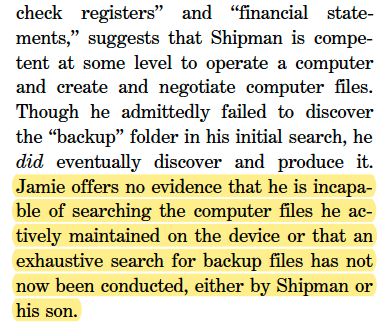


Leave a Comment